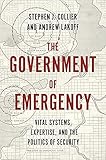The Government of Emergency : Vital Systems, Expertise, and the Politics of Security / Stephen J. Collier, Andrew Lakoff.
Material type: TextSeries: Princeton Studies in Culture and Technology ; 25Publisher: Princeton, NJ : Princeton University Press, [2021]Copyright date: ©2021Description: 1 online resource (480 p.) : 23 b/w illus. 2 tablesContent type:
TextSeries: Princeton Studies in Culture and Technology ; 25Publisher: Princeton, NJ : Princeton University Press, [2021]Copyright date: ©2021Description: 1 online resource (480 p.) : 23 b/w illus. 2 tablesContent type: - 9780691228884
- Disaster relief -- United States -- History -- 20th century
- Emergency management -- United States -- History -- 20th century
- SOCIAL SCIENCE / Sociology / General
- Act of God
- Aftermath of the September 11 attacks
- Authoritarianism
- Cataclysm (Dragonlance)
- Catastrophe modeling
- Catastrophism
- Centers for Disease Control and Prevention
- Civil defense
- Climate change
- Climate risk
- Collective security
- Conscription
- Constitution
- Constitutional dictatorship
- Contemporary society
- Contexts
- Continuity of government
- Critical infrastructure protection
- Critical infrastructure
- Decree
- Defense Production Act
- Demography
- Dictatorship
- Disaster
- Economics
- Emergency Preparedness
- Emergency communication system
- Emergency management
- Enemy Objectives Unit
- Energy crisis
- Executive order
- Federal Civil Defense Administration
- Federal Emergency Management Agency
- Federal government of the United States
- Financial crisis
- Foreign policy
- General Services Administration
- Governing (magazine)
- Government Office
- Government agency
- Homeland security
- Humanitarian aid
- Impose
- Infrastructure
- Institution
- Internal security
- Legislation
- Lend-Lease
- Liberal democracy
- Martial law
- Medical emergency
- Mercantilism
- Militarization
- Military history
- Military strategy
- Mobilization
- Modernity
- National Security Strategy (United States)
- National security
- Natural disaster
- Nuclear warfare
- Office for Emergency Management
- Office of Defense Mobilization
- Office of Emergency Management
- Office of Emergency Planning (Ireland)
- Paul Rabinow
- Planning
- Politics
- Preparedness
- Problematization
- Progressivism
- Provision (contracting)
- Public administration
- Reflexive modernization
- Reinsurance
- Risk management
- Scenario planning
- Securitization
- Security agency
- Separation of powers
- Sovereignty
- State of emergency
- Strategic National Stockpile
- Strategic intelligence
- Supply (economics)
- Technology
- Terrorism
- Total war
- Ulrich Beck
- United States Department of Homeland Security
- Vulnerability (computing)
- Vulnerability assessment
- Vulnerability
- War Powers Resolution
- War Production Board
- War economy
- Weimar Republic
- Westphalian sovereignty
- World War I
- World War II
- 353.9/5 23
- HV555.U6
- HV555.U6 C63 2021
- online - DeGruyter
| Item type | Current library | Call number | URL | Status | Notes | Barcode | |
|---|---|---|---|---|---|---|---|
 eBook
eBook
|
Biblioteca "Angelicum" Pont. Univ. S.Tommaso d'Aquino Nuvola online | online - DeGruyter (Browse shelf(Opens below)) | Online access | Not for loan (Accesso limitato) | Accesso per gli utenti autorizzati / Access for authorized users | (dgr)9780691228884 |
Browsing Biblioteca "Angelicum" Pont. Univ. S.Tommaso d'Aquino shelves, Shelving location: Nuvola online Close shelf browser (Hides shelf browser)

|

|

|

|

|

|

|
||
| online - DeGruyter Civil Society and Government / | online - DeGruyter American Afterlives : Reinventing Death in the Twenty-First Century / | online - DeGruyter All the News That’s Fit to Click : How Metrics Are Transforming the Work of Journalists / | online - DeGruyter The Government of Emergency : Vital Systems, Expertise, and the Politics of Security / | online - DeGruyter Privilege : The Making of an Adolescent Elite at St. Paul's School / | online - DeGruyter Papers of Thomas Jefferson – Retirement Series. The Papers of Thomas Jefferson, Retirement Series, Volume 18 : 1 December 1821 to 15 September 1822 / | online - DeGruyter The New Economic Sociology : A Reader / |
Frontmatter -- CONTENTS -- ILLUSTRATIONS -- PREFACE A Vulnerable World -- ACKNOWLEDGMENTS -- INTRODUCTION The New Normalcy -- PART I Crisis Government in the Great Depression and World War II -- 1 Vital Systems -- 2 Emergency Government -- PART II Demobilization and Remobilization -- 3 Vulnerability -- 4 Preparedness -- PART III Cold War Planning for National Survival -- 5 Enacting Catastrophe -- 6 Survival Resources -- EPILOGUE From Nuclear War to Climate Change -- NOTES -- BIBLIOGRAPHY -- INDEX
restricted access online access with authorization star
http://purl.org/coar/access_right/c_16ec
The origins and development of the modern American emergency stateFrom pandemic disease, to the disasters associated with global warming, to cyberattacks, today we face an increasing array of catastrophic threats. It is striking that, despite the diversity of these threats, experts and officials approach them in common terms: as future events that threaten to disrupt the vital, vulnerable systems upon which modern life depends.The Government of Emergency tells the story of how this now taken-for-granted way of understanding and managing emergencies arose. Amid the Great Depression, World War II, and the Cold War, an array of experts and officials working in obscure government offices developed a new understanding of the nation as a complex of vital, vulnerable systems. They invented technical and administrative devices to mitigate the nation’s vulnerability, and organized a distinctive form of emergency government that would make it possible to prepare for and manage potentially catastrophic events.Through these conceptual and technical inventions, Stephen Collier and Andrew Lakoff argue, vulnerability was defined as a particular kind of problem, one that continues to structure the approach of experts, officials, and policymakers to future emergencies.
Mode of access: Internet via World Wide Web.
In English.
Description based on online resource; title from PDF title page (publisher's Web site, viewed 01. Dez 2022)


